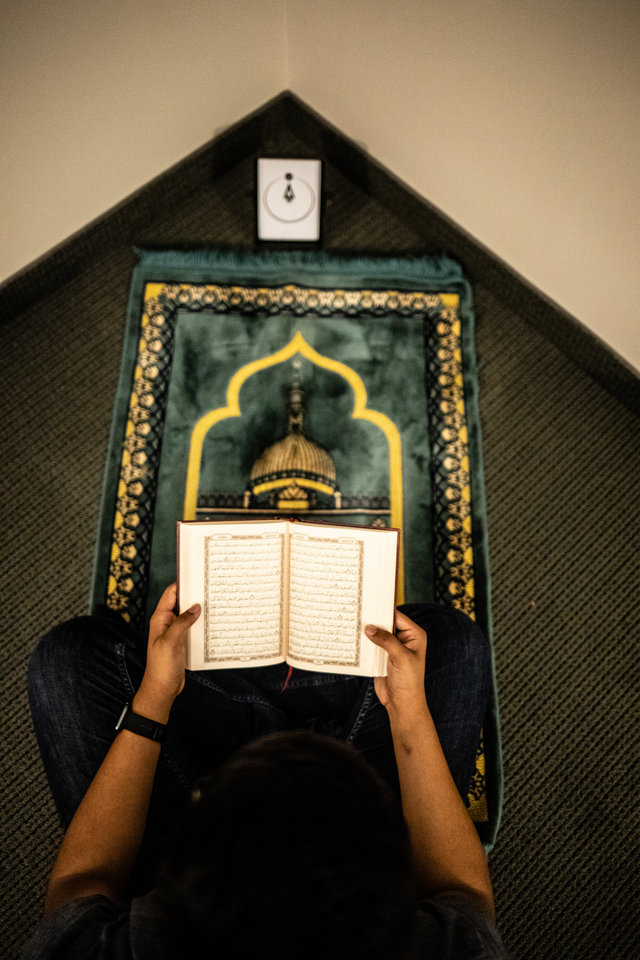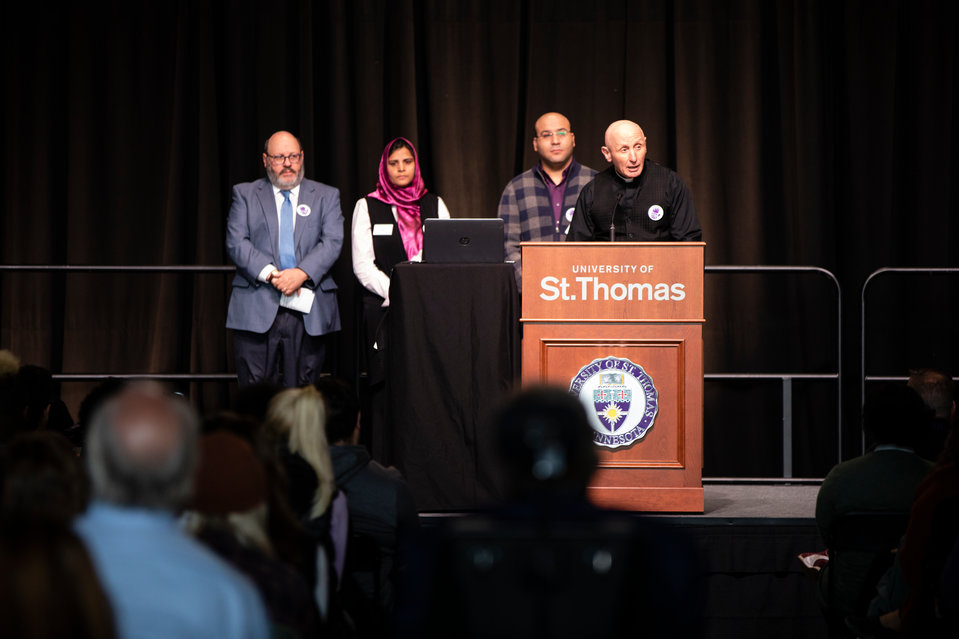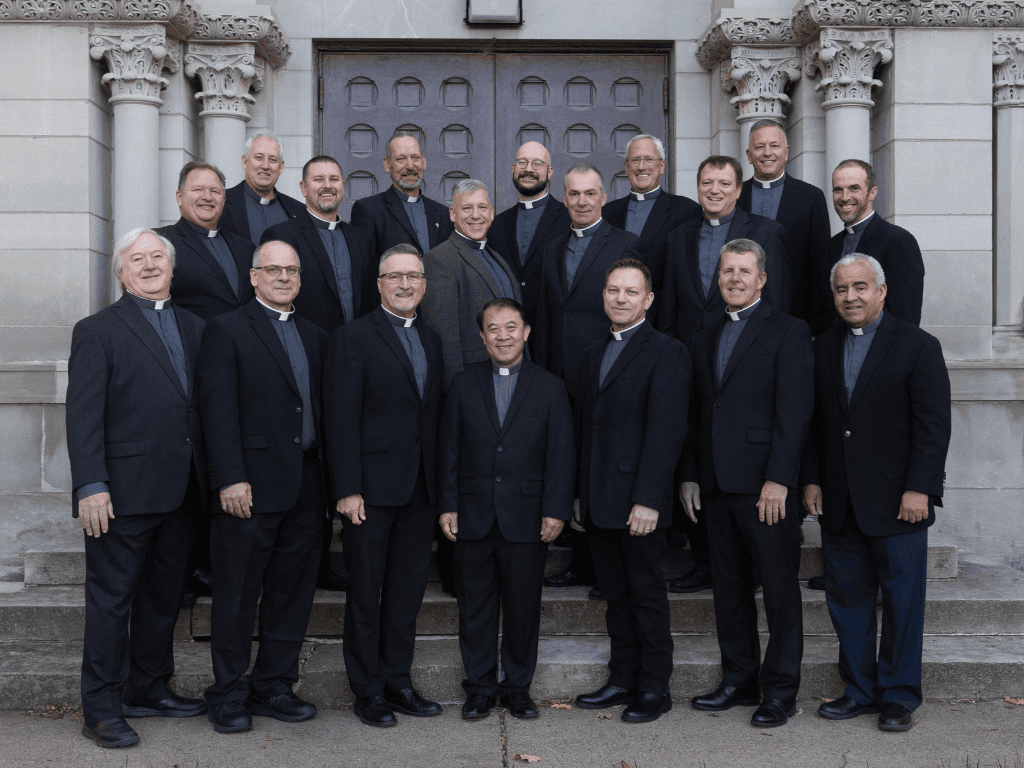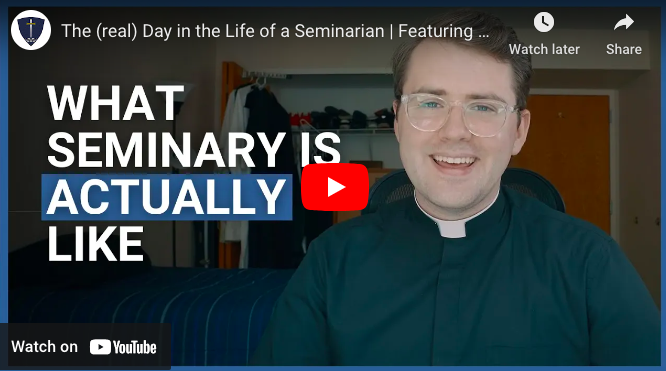One way of thinking about different faiths on the St. Thomas campus is like this: The St. Thomas undergraduate class entering the university in the fall of 2018 self-identified 17 different religious affiliations.
Now, those are official categories, and include students stating “no religious affiliation,” a number that has increased from 43 in 2014 to 170 in 2018. Included as well is Roman Catholic, which remains the majority of undergraduate students responding in recent years. (Fewer students have designated religious affiliation since St. Thomas’ admissions process transitioned in 2017 to the Common Application, which can be used at both public and private schools; 210 students in 2018 declined to respond to religious affiliation, compared to 14 in 2017.)
The general fact, though, is this: There are a lot of different faiths represented across St. Thomas. That isn’t anything close to a new phenomenon, but in recent years a much more critical approach has been taken to how the university respects, celebrates and promotes different faiths , as well as how they are encouraged to interact with one another.
“There is a movement, something afoot here at St. Thomas,” said Hans Gustafson, director of St. Thomas’ Jay Phillips Center for Interfaith Learning.
New approaches
When Father Larry Snyder arrived as vice president for mission in early 2015, the Jay Phillips Center (originally the Jewish-Christian Dialogue Center until 2009) was the central hub of almost all interfaith activity on campus.
“Catholic Ministry and other offices can remain Catholic-centric because we have the Jay Philips Center,” Gustafson said of the thinking at the time. The limitations of that were consistently clear to Gustafson.
“Over the first five years I was here [from 2011-2016] I had students that would show up, non-Christian students, who would say, ‘Campus Ministry told me to come to you.’ It took a while, but what I figured out was that these students were looking for spiritual nourishment on campus, something you would go to Campus Ministry for, and they were sending them to us,” he said.
Snyder saw opportunity in this, and in 2016 began a transition of Campus Ministry away from purely Catholic-focused services toward support of different faiths. In the spring of 2017 the Office for Campus Ministry hired a Presbyterian minister, Jewish rabbi and Muslim faith leader onto its pastoral staff, another step forward in the university’s push toward supporting all faiths on campus and throughout the St. Thomas community. Those new leaders include the Rev. Medhat Yoakiem of the Presbyterian faith; Sadaf Rauf Shier of the Islamic faith; and Rabbi Alan Shavit-Lonstein of the Jewish faith.
“In [the 1990 book] Ex Corde Ecclasiae, which laid out a vision for Catholic universities and colleges, Pope John Paul II clearly states that it is the responsibility of a Catholic university to foster the development of all of its students’ spiritual lives, and then, comma, especially those who are Catholics. So, before the comma, he's talking about everybody,” said Snyder, who also pointed to an expansion of Catholic-related care, as well, by the addition of a third priest to Campus Ministry’s office.
“It’s a very exciting time,” said Father Larry Blake, chaplain and director of Campus Ministry. “As a Catholic university we are committed to enabling the spiritual growth of all our students. We recognize they come from diverse faith traditions and we want to honor that.”
Almost immediately students took notice of the new faith leaders on campus.
“My second day here, a Saudi student, international woman, came and said, ‘Eid [a celebration marking the end of Ramadan] is coming; we want to celebrate. What can we do together?’ From there we started preparation, but that made me think that there is some kind of trust already present. This kind of direct question cannot happen without trust already present. We’ve built upon that, and that’s wonderful,” Shier said. “The goal of the interfaith work overall is that in the times when people are using religion as a tool to stigmatize and harm others, we use religion as a bonding agent. The goal is that students from whatever faith community, they feel comfortable. They don’t feel threatened.”

Jeannine Hill Fletcher, professor of theology at Fordham University, speaks during the Jay Phillips Center for Interfaith Learning speaker series in McNeely Hall.
‘Don’t have to be an expert in every faith’
At the same time momentum was building around faith development in Campus Ministry, Student Affairs has been improving its own abilities to support students of all faiths. In 2016, Vice President for Student Affairs Karen Lange, Snyder and Camille George, associate dean of engineering, heard a speech from Eboo Patel, a national leader in interfaith education and president of the Interfaith Youth Core. Soon afterward, Interfaith Youth Core helped St. Thomas conduct a survey on its faith climate on campus.
“We found we were much more conservative than other campuses and what they were working on,” Lange said.
Soon afterward, Interfaith Youth Core trained Student Affairs staff on how to more intentionally create opportunities for different faiths to be practiced and celebrated on campus, and how to create opportunities for interfaith encounters.
“Our staff worried initially that we’re not experts in this, that we can’t do this. They came in and did this training, and everyone realized you don’t have to be an expert in every faith. It’s about bringing in the appropriate people or creating situations where that kind of dialogue can happen,” Lange said. “We’ve started incorporating [faith] in a much more intentional way than in the past.”
In the two years since there have been many events and cocurricular events and activities directly stemming from this intentionality, including in how they are held. Many students and staff worked with Dining Services to address the university’s policy that food cannot be catered from off campus; for cultural- and faith-based events there are now exemptions to guarantee authentic food is available for events. The finances of those events have changes, as well, as the creation of the Diversity Activities Board has helped make sure students aren’t bearing the full costs of getting food for large events like the Eid celebration Shier referenced. Dining Services has also worked to create more options and education around religious-specific foods.
“During the month of Ramadan there were dates out and informational cards about their importance,” Shier said. “Instead of students’ feeling ashamed about their religion, they take pride. We want people to be more interested in each other’s faith and learning.”

Students laugh and eat a meal in the Muslim prayer space in Loras Hall on south campus in St. Paul.
Intentional renovations
Moving beyond the four Muslim prayer and foot washing spaces created in 2013 in Loras Hall on the south campus of St. Paul, washing pots were also added last year to bathrooms in Anderson Student Center, making cleansing options more readily available for Muslim students, as well as increasing education for other students’ about the purification element of prayer.
Another step forward will come with the completed renovation of the Chapel of St. Thomas Aquinas in 2020, which will include a new space dedicated to prayer and religious activities for all faiths. The footprint of the current chapel will remain just for Catholic sacraments, but the construction of additional spaces will mean opportunities for faiths beyond Catholicism to be practiced.
“We are called by the church to walk with everyone on their faith journey,” President Julie Sullivan said. “We’re called to be inclusive, respect their faith and be there to support them deepening their faith. Pope Francis talks about that a lot. We’re here for all of our students. … Our mission is to help every student in their spiritual and faith journey.”
The renovation will also bring Campus Ministry and other support staff into one space, furthering the goal of bringing different faiths into contact with each other.
“There is a thirst there. People want some help and there is an openness to receiving that help, which I think is great,” Shier said of people growing their understanding of faiths beyond their own. “When there is a difficult question or moment between faiths that is a great blessing. … A moment of guided discomfort, guided navigation through that discomfort, takes us to a better place. For students, there is a sense of respect and appreciation for that.”
Ongoing work
As a board member of the Muslim Student Association, senior Yusuf Mohamoud has worked hard to create opportunities for himself and fellow students to live out their faith on campus. Throughout his years the bulk of that work has been has been done by students, he said, but he has sensed a change in support in the recent past.

A student reads the Quran in the Muslim prayer space for men in Loras Hall on south campus in St. Paul.
“I would say it’s become much easier to be a Muslim on campus,” he said.
More difficult, Mohamoud said, is in building connections across different faiths, whether through student groups or university events. With this reality in mind, Snyder and the Office for Mission formed the Interfaith Council in the fall of 2017, which regularly brings together six students, including Mohamoud, six faculty and six staff members of different faiths to coordinate efforts across campus and discuss interfaith possibilities. Areas like the create[space] in the Anderson Student Center have been more often used for religious and interfaith activities than in the past, expanding well beyond what had been almost entirely interfaith programming from the Jay Phillips Center for Interfaith Learning and the former Muslim-Christian Dialogue Center.
“I’ll hear about programs around interfaith on campus that we had nothing to do with, and that’s good. We’re no longer the only hub,” Gustafson said. “[Students and Student Affairs] are really the ones carrying it out and developing the programs. Interfaith is pervading the campus now and finding ways their roles can fit.”
All of this ongoing growth and energy can be linked directly back to St. Thomas’ strategic plan, which in 2014 articulated that, “As a Catholic institution, the University of St. Thomas recognizes the basic human dignity of all persons and will work to create an environment of radical hospitality premised on the development and flourishing of every community member. We seek to increase the diversity of our student populations. We also strive to support better the diversities within our community, broadly defined. This includes not just racial/ethnic diversity, but also creed, religion, ancestry, national origin, sex, sexual orientation, disability, age, marital status or economic/social status.”
Not long afterward, Pope Francis visited Sri Lanka in 2015 and called on Catholics to look for common ground with other faiths.
“As experience has shown for [interreligious] dialogue and encounter to be effective, it must be grounded in a full and forthright presentation of our respective convictions,” he said. “Certainly, such dialogue will accentuate how varied our beliefs, traditions and practices are. But if we are honest in presenting our convictions, we will be able to see more clearly what we hold in common. New avenues will be opened for mutual esteem, cooperation and, indeed, friendship.”
More and more throughout the St. Thomas community, people are helping each other move forward in a better appreciation and understanding of one another’s faith.
“It's because we’re a Catholic school this is important,” Lange said. “It’s not watering us down being Catholic, or making us any less Catholic. It’s about welcoming people of all faiths, but including faith, sharing your faith and working side by side.”







